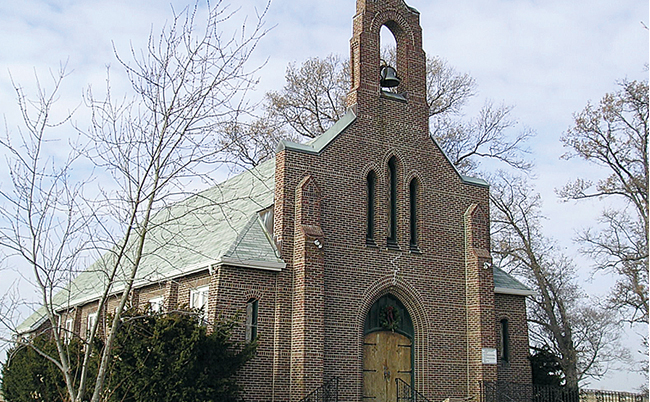By SUZANNE KOZIATEK
Contributing writer
For nearly two centuries, Catholics in Gallatin County in the far southeastern corner of Illinois somehow found ways to worship together.
Masses were said in pioneer homes, in log churches, and then larger brick and stone churches were built – St. Joseph in Ridgway, a second St. Joseph in Equality, Immaculate Conception (St. Mary) in Shawneetown and St. Patrick in Pond Settlement.
Over the years, consolidation has drawn the churches together. The 2012 destruction of St. Joseph in Ridgway by a tornado and the construction of St. Kateri Tekakwitha, Lily of the Mohawks, in its place provided a new hub for worship in the county.
The three remaining churches — St. Joseph in Equality, Immaculate Conception (St. Mary) and St. Patrick – had been designated as chapels attached to St. Kateri Parish. Now, in the next phase of that consolidation, the three chapels will be closed and turned over to secular use.
A June 24 decree by Bishop Edward K. Braxton announced the closings of the three chapels, effective Oct. 20.
Daily Masses, which have been rotating among the chapels, move entirely to St. Kateri Church beginning Oct. 1. The chapels also have been rotating Saturday evening Masses; that rotation will continue through Oct. 20. The chapels will be available for baptisms, weddings and funerals through that date, says Father Steven Beatty, pastor of St. Kateri and newly appointed Vicar Forane of the diocese’s South Vicariate.
Beatty acknowledges that this is a difficult time for longtime parishioners of the former churches. He says he asked whether anyone wanted to do any kind of special ceremony to mark the transition.
“The answer I got was, ‘Why would we put ourselves through that?’” he says.
Father Beatty says the four churches were working closely together even before the Pastoral Plan for Parish Renewal and Restructuring was announced in 2011.
They rotated Masses, and shared a parish council and finances.
“In February 2012, we went through the process of becoming one parish officially, as we almost were in practice,” Beatty says. He notes that the longest drive between any of the two churches is about 15 minutes.
Then came Feb. 29, 2012, when a tornado tore through St. Joseph Church in Ridgway, destroying the German gothic structure.
St. Kateri Tekakwitha Catholic Church, named for the first American Indian ever canonized, was built on the same site.
Among the few items saved from St. Joseph’s were the bells from the bell tower and an ornate marble altar, both of which were installed in St. Kateri. The new church also contains pieces of the former communion railing from St. Mary in Shawneetown, and stained glass from St. Francis Xavier Church in St. Francisville, which was suppressed in 2014.
In a similar way, Father Beatty says, holy objects such as tabernacles from the three chapels will be preserved so that they can be used for their intended purpose elsewhere. Some items may be kept by St. Kateri.
“We’ll have to make determinations on an item-by-item basis,” Father Beatty says.
The church properties will be “relegated to profane or secular use,” which removes their dedication and blessing and allows them to be sold. The property may not be used for what the church terms a “sordid” use – anything sacrilegious or immoral.
Father Beatty says he’s now starting to work on some options for disposing of the properties. Options may include destruction of the buildings themselves.
“There are different scenarios, but nothing’s been set yet,” he says.
The four churches’ cemeteries are not affected by the decree. “They’re separate entities from the churches, and all will be available for use,” Beatty says.
In the years since St. Kateri opened, parishioners have embraced the church, he says. There are 575 registered households in the combined parish, and he estimates that about 300 people attend weekend Masses.
Saturday attendance, which rotates among the older churches, tends to draw fairly consistent attendance. And while some parishioners have specifically asked that special Masses such as funerals be held at their old home churches, the majority now are held at St. Kateri.
Still, Father Beatty knows that many parishioners will have complicated feelings about this newest change to their Catholic community.
“As a pastor, I want to be respectful of the grief that people feel about this,” he says. “That grief is real. But it’s also important to note that St. Kateri Parish is a very vibrant, growing parish. I think everyone would agree about that, regardless of how they feel about (the closings).
“The parish is really in a good place,” he added.







